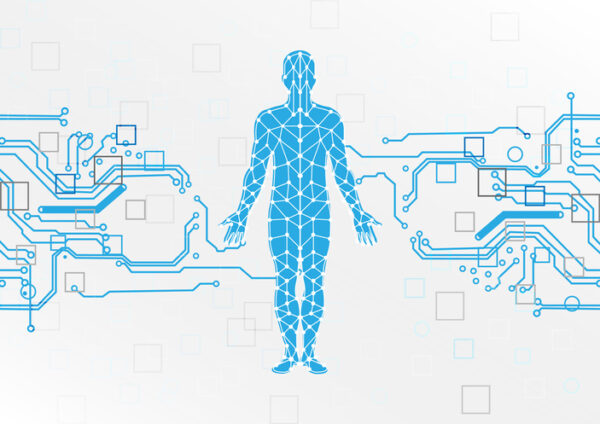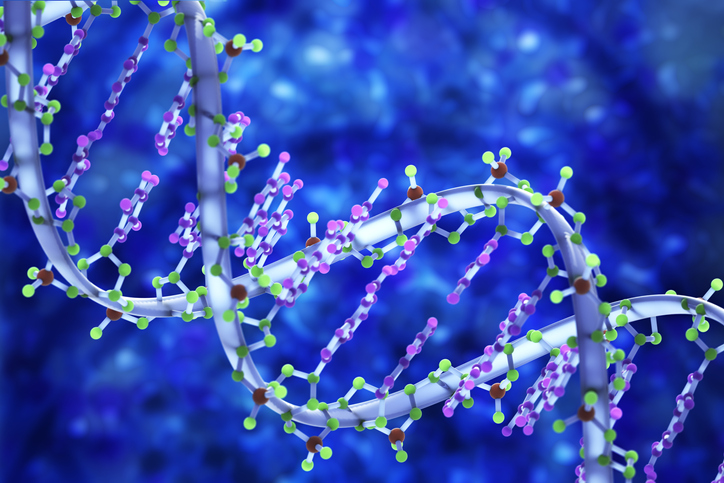
“Precision medicine” is a term we have heard a lot over the last two decades, promising to improve health outcomes by pairing the patient with the right treatment. In cancer, we do this primarily with biomarkers. Our understanding of biomarkers – signatures of key features of a tumor – and their role in disease has grown considerably. Currently, testing for biomarkers in the clinic is often time consuming and costly. Recent advancements in artificial intelligence (AI) may reshape how we detect existing biomarkers and identify new biomarkers entirely. AI-assisted, digital biomarker assays may help make precision medicine available for more patients than ever.
Seeing beyond to improve patient care
Digital biomarker assays are task-specific AI models that can identify specific features on a digitized version of slide tissue to improve diagnosis or predict how well that tumor will respond to a particular treatment. To build these assays, AI is developed that can spot patterns in tissue that may not be discernable to human eyes. The AI must first be trained to distinguish cancerous tissue from normal tissue, often training on thousands of scanned digitized microscope slides. Then, the AI models can be trained to recognize specific features within the tumor or in the cells and stroma around and among it to find patterns that improve diagnosis.
Digital biomarkers can work in many different ways. Some digital biomarkers can standardize human interpretation of microscopic features of cancer or special stains done on tumor cells. For example, the shape and “look” of prostate cancer cells, called a Gleason grade, is evaluated and used to predict prognosis and help prostate cancer doctors decide when treatment is required. Using clinical AI, pathologists can standardize this grading to help make sure that a Gleason grade on a particular tumor is evaluated the same, no matter which human is looking at the case. The same is true for biomarkers, which can be even harder to quantify without subjectivity. Using AI to support tumor quantification helps ensure that the right score is found and the right treatment can be identified. Additionally, quantification of special stains like immunohistochemistry (IHC) can be tedious and tricky for humans to evaluate at times as well. AI algorithms can be trained to evaluate these stains, helping humans interpret them faster and with greater confidence that they have the “right” score for that patient’s tumor. If the tumor does not appear to have a targetable mutation, then the patient and the healthcare system can save time and money, while avoiding a treatment that is not likely to work for them.
Making biomarker testing nore accessible
This approach makes biomarker testing much more accessible, because the algorithms can be run on standard tissue slides stained with hematoxylin and eosin (H&E). H&E-stained slides are used in laboratories all around the world, cost less, and are more reproducible than other stained slides used for biomarker identification like IHC or in situ hybridization. AI provides a standardized and quick way of identifying the presence of known and novel biomarkers in those slides and can be done in minutes. This means oncologists can make treatment decisions and get their patient the right medicines faster.

Health Benefit Consultants, Share Your Expert Insights in Our Survey
Joe Oakley Dr. Joe Oakley is the medical director of biomarker development at Paige and a pathologist with board certification in anatomic, clinical and molecular genetic pathology. His work experience ranges from academic clinical practice to the pharmaceutical and information technology industries. He has overseen and directed development of liquid biopsy, molecular and immunohistochemistry assays […]
Because digital biomarker assays can be run from the cloud on H&E slides, a laboratory needs only an Internet connection and a scanner which can capture digital images of the tissue slides. If laboratories do not have a scanner, they can send tissue samples to a reference laboratory to scan and analyze those tissue samples—a process they already do for many forms of slower specialized testing. Ultimately, these advances can bring personalized medicine to patients who might not have been able to access comprehensive biomarker testing in the past.
The road ahead for AI
In the next few years, AI tools will increasingly be used by pathologists and patient care teams in treatment and clinical trial settings. AI will not replace doctors or researchers but instead be used as another diagnostic tool to augment and improve clinical care and biomedical research, just as other diagnostics have done. Institutional changes will also assist in this digital transition and evolution. For example, the American Medical Association launched new Current Procedural Terminology (CPT) codes for digital pathology beginning January 1, 2023 to track the increasing use of this new technology.
Digital biomarkers are still very much in early days. However, the promise they offer lies in the ability to enhance efficiency and relative cost-effectiveness for existing biomarkers, as well as their ability to identify novel biomarkers that can go beyond existing methods to better tailor patient treatment. This is what will propel AI tools into clinical trials and pathology labs. Intelligent design, development, and employment of AI can augment the pathologist and oncologist, and may soon provide crucial tools for giving patients the best chance at beating cancer. Through advances in digital pathology, we can finally bring important advances in personalized medicine closer to patients who might not have been able to benefit in the past.
Photo: mrspopman, Getty Images
Dr. Joe Oakley is the medical director of biomarker development at Paige and a pathologist with board certification in anatomic, clinical and molecular genetic pathology. His work experience ranges from academic clinical practice to the pharmaceutical and information technology industries. He has overseen and directed development of liquid biopsy, molecular and immunohistochemistry assays for both diagnostic and therapy predictive applications for personalization of medicine. His goal is to link mechanistic understanding of metastasis and clonal evolution in tumor pathology to personalize patient therapy and bring superior regimens to the clinic.
Prior to joining Paige, Dr. Oakley was Associate Vice President / Medical Fellow at Eli Lilly where he oversaw molecular pathology assay development for the diagnostic and experimental pathology group. He also previously served as a pathologist, medical director of clinical molecular diagnostics, and associate professor at Marshall University.













